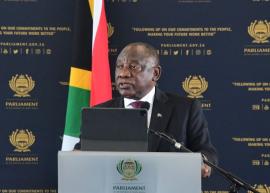
As South Africa marks 30 years of democracy, President Cyril Ramaphosa has acknowledged the great progress government has made in lifting millions of South Africans out of absolute poverty.
The President was delivering his annual address to the National Council of Provinces (NCOP) in Parliament, Cape Town on Thursday.
The address and debate was held under the theme: “Dedicating our Efforts Towards Reducing Poverty and Tacking the High Cost of Living”.
The President highlighted that in 1993, 71% of South Africans lived in poverty, by 2010 the poverty rate had dropped to 61% and in 2020, it was at 56%.
He further acknowledged that people’s lived experiences confirm the persistence of poverty and inequality.
“As we work to rebuild the economy, to create more employment and open opportunities for emerging businesses, we continue to assist the poorest and most vulnerable in our society.
“We provide various forms of support and protection through the ‘social wage’. This includes the provision of social grants, free basic services, health care, basic education, higher education, social housing and transport. When debt servicing costs are excluded, around 60% of government’s budget is spent on the social wage,” the President said.
President Ramaphosa said that while parties in the Government of National Unity differ on certain issues, they have committed themselves to inclusive economic growth and accelerated job creation.
“They have committed themselves to reduce poverty and tackle the high cost of living. And, to advance these priorities, the parties to the Government of National Unity have committed themselves to build a capable, ethical and developmental state.
“The decision by the NCOP to dedicate this debate to focus on our collective efforts to reduce poverty and tackle the high cost of living is a worthy and timely response to the mandate of the people,” the President said.
President Ramaphosa emphasised that a vital part of the effort to reduce the cost of living is the provision of a free basic minimum of services to indigent households.
Through this programme, millions of people have been able to access basic needs like electricity and water.
He highlighted that social grants remain a lifeline for millions of people, particularly children, the elderly and persons with disabilities.
“The introduction of the Social Relief of Distress Grant during the COVID-19 pandemic has provided much-needed relief to as many as 11 million unemployed people at its peak. Today, around a half of all households in South Africa benefit from social grants.
“Among the measures to ensure that all South Africans have affordable access to sufficient food, government is looking at whether the basket of food items that is exempted from VAT could be expanded to include more basic products,” he said. – SAnews.gov.za


